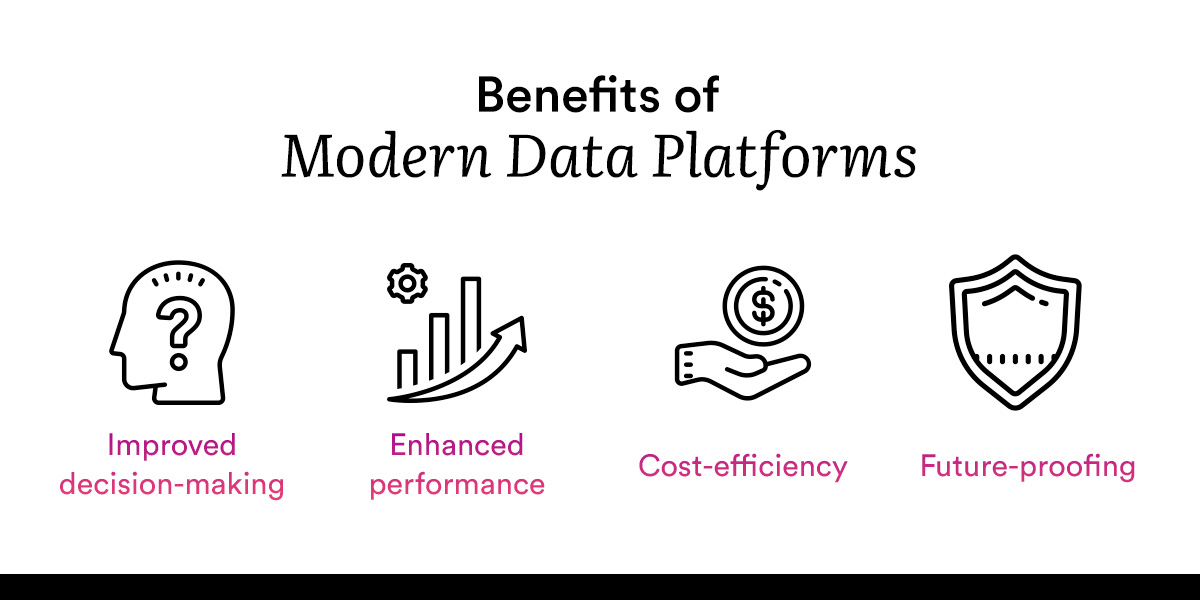
Your business is constantly dealing with streams of data. With so much data needing processing, collecting, and organizing, modern companies need a way to manage it effectively.
Enter modern data platforms (MDPs). These platforms are reliable solutions for managing and leveraging all your data. MDPs make optimizing your operation easier than ever. Understanding data platform capabilities can help you unlock your data’s full potential.
What Is a Data Platform?
A data platform is a central space that holds and processes your data. A unified data platform takes all your data from each source and collects, manages, stores, and analyzes it. Traditionally, data platforms had limited data-handling abilities. They often had data silos — data stores that were disconnected from the rest of the data. Modern data platforms, however, are more advanced and convenient.
An MDP is a data platform designed to handle the data demands of the modern day. These data platforms are built to handle data from multiple sources. They can easily scale with your needs, processing data in real time and giving you the tools to analyze it effectively. Big data platforms are a version of MDPs that work with data on a vast scale. With a quality MDP, you can make more accurate decisions, adapt quickly to market changes, and maintain productivity.
Modern Data Platform Features
An MDP is a more advanced enterprise data platform (EDP) version. EDPs manage all your data in a central hub. At the same time, MDPs take this feature and add to it with data analysis, decision-making, and even machine learning (ML) or artificial intelligence (AI). You can break MDPs down into several key components that work together to maximize your data use:
- Data ingestion: This is the first step. Your MDP collects and imports data from databases, sensors, application programming interfaces, and more. Data flows into and through the MDP, collecting in a central space.
- Data storage: Once ingested, the MDP stores your data. Data warehouses and cloud-based data storage spaces can hold significant amounts of data. Storage is set up for easy organization and retrieval.
- Data processing: After ingestion and storage, data needs processing. Processing takes the data and turns it into an analyzable format. Data processing includes batch and real-time processing, allowing you to instantly receive information on your data.
- Analytics: Next comes analytics. MDPs take your data and use various tools to find patterns and insights. These analytics give you an unmatched understanding of your data, letting you make more strategic decisions.
- Security and compliance: MDPs come with strong security measures to prevent data from becoming vulnerable to attacks and other incidents. Security is essential for protecting data and maintaining data regulation compliance.
- Orchestration: Orchestration involves getting everything where it needs to be when it needs to be there. It oversees two processes — moving data between components and automating workflows.
Modern Data Platform Applications Across Industries
Modern data platforms allow industries to manage their data more effectively. With the right MDP, your company can easily manage data and derive better insights. Here are some data platform examples in different industries:
- Manufacturing: Predictive maintenance data lets manufacturing companies know when to send equipment for upkeep. Additionally, MDPs can improve quality control efforts by checking data.
- Retail: The retail industry uses MDPs to analyze customer behavior and personalize shopping experiences.
- Health care: MDPs in health care settings streamline operations and improve the patient experience. Health data needs secure protection and efficient management to meet compliance and improve care standards.
- Financial: The financial sector relies on MDPs to detect fraud, personalize products, and assist with risk management.

Benefits of Modern Data Platforms
If you’re looking to overhaul your business’s approach to data, MDPs can help. Consolidating data and improving its management has many benefits for your operation, including:
- Improved decision-making: Better data processing and real-time analytics boost your decision-making capabilities. Teams can use accurate, up-to-date data to respond quickly and effectively to market changes, customer needs, and other challenges.
- Enhanced performance: MDPs are designed to handle massive amounts of data while adjusting to your needs. MDPs scale with your data, efficiently managing everything without slowing down.
- Cost-efficiency: Traditional manual data handling is expensive to scale and maintain. MDPs let you only pay for what you use, ensuring you work within your budget and needs.
- Future-proofing: As technology changes and data needs grow, MDPs can evolve with them. Incorporate new tools, data sources, and technology into your MDP without overhauling your central infrastructure.
Potential Challenges in Implementing Data Platforms
While data platforms are excellent tools for handling data, getting the infrastructure in place can be challenging. Investing in the right partner is essential for ensuring you have the support you need for success. Some data platform challenges you might face are:
- Integration complexities: Integrating your diverse data sources and systems can be challenging. Legacy systems often struggle to work with modern platforms. It takes a quality platform and expert support to make your data flow seamless.
- Data quality and consistency: Data quality is key for strategic decision-making. However, integrating data from different sources can lead to duplicates, errors, and incomplete data. To ensure accurate data, you need processes for cleaning, standardizing, and validating data.
- Security concerns: More centralized data can also mean more cyberattack threats. You need an MDP with strong security measures to protect your data from cyberattack threats.
- Skill gaps and resource allocation: MDPs can require specialized skill sets in data analytics and engineering. Finding the talent to manage your MDPs can strain your current budget and resources.
The Future of Modern Data Platforms
As advanced as current MDPs are, they’re only going to become more powerful. AI and ML are changing how we approach data. Automating data processing allows these strategies to deliver faster, more accurate insights.
AI-driven platforms can spot patterns, predict trends, and make decisions independently. Using AI can also free up your human talent for more complex tasks. ML models improve with every piece of data they learn from. They can develop advanced predictive capabilities the longer you use them.
JumpStart Your Data Platform Journey
Your data is one of your most valuable assets. Fully harness your data and drive innovation with help from Kopius. We specialize in helping businesses leverage advanced data analytics, machine learning, data governance, and more to make smarter, data-driven decisions.
Whatever your challenges, our experts are here to help. We provide comprehensive data solutions tailored to your unique needs. With Kopius, you can create insightful dashboards, improve data security, and more.
Reach out to Kopius today and see how we can JumpStart your long-term success!

Related Services: